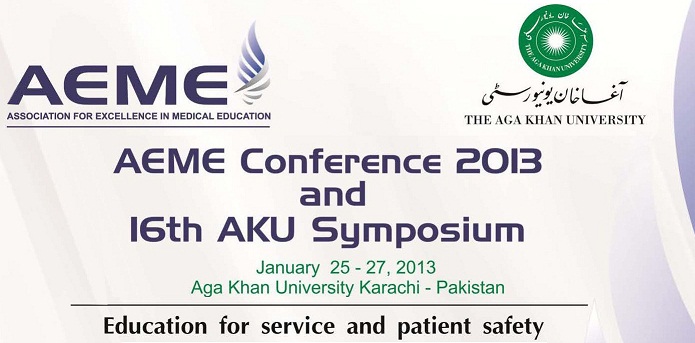Day 1 : Oral Presentations (Theme: Curriculum Innovations)
Do geriatric home visits enhance learning of postgraduate trainees? –A qualitative study from Pakistan
Location
AKU Auditorium
Start Date
26-1-2013 11:00 AM
Abstract
Background: The Family Medicine Residency Program at the Aga Khan University, Karachi incorporated a didactic and clinical course on elderly care in 2009. To enhance experiential learning; a pilot home visit program was added for the final year residents. This is the first time that home visits have been incorporated as part of post-graduate training in Pakistan. Home visits are unique as they allow physicians to assess and experience the health problems of the aged in their own environment. The purpose of this study was to identify residents’ experience of home visits and to assess whether nursing/ home visits enhanced their understanding of geriatrics and their role in taking care of aged patients.
Methods: Two batches of final year residents (n=9) consented to participate. Focus group discussions (FGD) and phone interviews were conducted In the FGD, a trained facilitator used broad questions made by the research team to explore participant perceptions. Responses were video- taped, transcribed and shared with participants for member checking. Phone interviews conducted were also recorded, transcribed and collated with data from FGD. Members of the research team then coded the data and generated themes independently which were then compared, merged and analyzed. Quotations by participants were documented.
Results: The home visit experience was regarded as overwhelming positive and innovative. Uniqueness of nursing home visits in skill building was reported by most participants. Complexity of assessing and managing geriatric patients was acknowledged. Trainees expressed frustration with point of care testing and treatment adherence which hindered their learning in terms of patient outcomes. They also reported these visits as opportunities for self-reflection and introspection. One participant reported the possibility of choosing geriatrics as a career choice.
Conclusions: The nursing home program strengthened geriatric knowledge and skills of trainees, fulfilling their learning objectives and provided a unique experiential opportunity to care for the elderly. Such programs may be replicated in regional universities to enhance geriatric skills in trainees.
Key words: “geriatric training”, “home visits”, “nursing homes”
Do geriatric home visits enhance learning of postgraduate trainees? –A qualitative study from Pakistan
AKU Auditorium
Background: The Family Medicine Residency Program at the Aga Khan University, Karachi incorporated a didactic and clinical course on elderly care in 2009. To enhance experiential learning; a pilot home visit program was added for the final year residents. This is the first time that home visits have been incorporated as part of post-graduate training in Pakistan. Home visits are unique as they allow physicians to assess and experience the health problems of the aged in their own environment. The purpose of this study was to identify residents’ experience of home visits and to assess whether nursing/ home visits enhanced their understanding of geriatrics and their role in taking care of aged patients.
Methods: Two batches of final year residents (n=9) consented to participate. Focus group discussions (FGD) and phone interviews were conducted In the FGD, a trained facilitator used broad questions made by the research team to explore participant perceptions. Responses were video- taped, transcribed and shared with participants for member checking. Phone interviews conducted were also recorded, transcribed and collated with data from FGD. Members of the research team then coded the data and generated themes independently which were then compared, merged and analyzed. Quotations by participants were documented.
Results: The home visit experience was regarded as overwhelming positive and innovative. Uniqueness of nursing home visits in skill building was reported by most participants. Complexity of assessing and managing geriatric patients was acknowledged. Trainees expressed frustration with point of care testing and treatment adherence which hindered their learning in terms of patient outcomes. They also reported these visits as opportunities for self-reflection and introspection. One participant reported the possibility of choosing geriatrics as a career choice.
Conclusions: The nursing home program strengthened geriatric knowledge and skills of trainees, fulfilling their learning objectives and provided a unique experiential opportunity to care for the elderly. Such programs may be replicated in regional universities to enhance geriatric skills in trainees.
Key words: “geriatric training”, “home visits”, “nursing homes”

